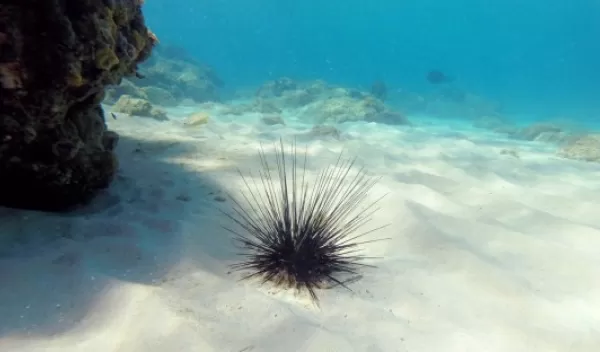
Massive Caribbean sea urchin die-off caused by parasite
Scientists have discovered that a parasite is behind a severe die-off of long-spined sea urchins across the Caribbean Sea, which has had devastating consequences for coral reefs and surrounding marine ecosystems.
The long-spined sea urchins, Diadema antillarum, serve as vital herbivores that graze on algae, which if left unchecked will outcompete corals for resources and space and blanket them, block light and kill them. By feeding on algae, the sea urchins are essential to maintaining coral health and balance in the marine ecosystem.
Diadema mortalities were first reported in St. Thomas in the U.S. Virgin Islands in late January, 2022. By late March, the condition was found across the Lesser Antilles, Jamaica and the Mexican Caribbean. And by June of last year, it had been detected in most of the Greater Antilles, Florida and Curacao.
Scientists have been trying to identify the cause of the mysterious illness, which has led to declines of between 85% and 95% compared to premortality numbers in affected areas. When sea urchins die, they lose their spines and detach from their anchors.
Now, an international team of 42 scientists has identified the culprit as Philaster apodigitiformis, a unicellular eukaryote that is part of a group of 8,000 species called ciliates. P. apodigitiformis is a known parasite in fish.
"Rarely are we afforded the opportunity to understand marine disease events in this detail, where we can actually work out a cause of it," said marine ecologist Ian Hewson of Cornell University, lead author of a U.S. National Science Foundation-supported paper published in Science Advances.
Though scientists do not yet know how to treat P. apodigitiformis infections, Hewson said, discovering the parasite's identity may help them design strategies for maintaining health in Diadema sea urchins that are being raised for restocking efforts across the region.
“There's a long history of Diadema die-off; the big one happened in the 1980s, with the cause still unknown, and cascaded into a loss of 80-90% of the coral cover in the Caribbean," said Dan Thornhill, a program director in NSF's Division of Ocean Sciences. "There were a lot of factors involved, but the urchin die-off was the tipping point. It's an ecological tragedy. It's fairly rare and exciting to identify the parasite or pathogen behind one of these diseases in marine ecosystems, and to do it this quickly is impressive."
